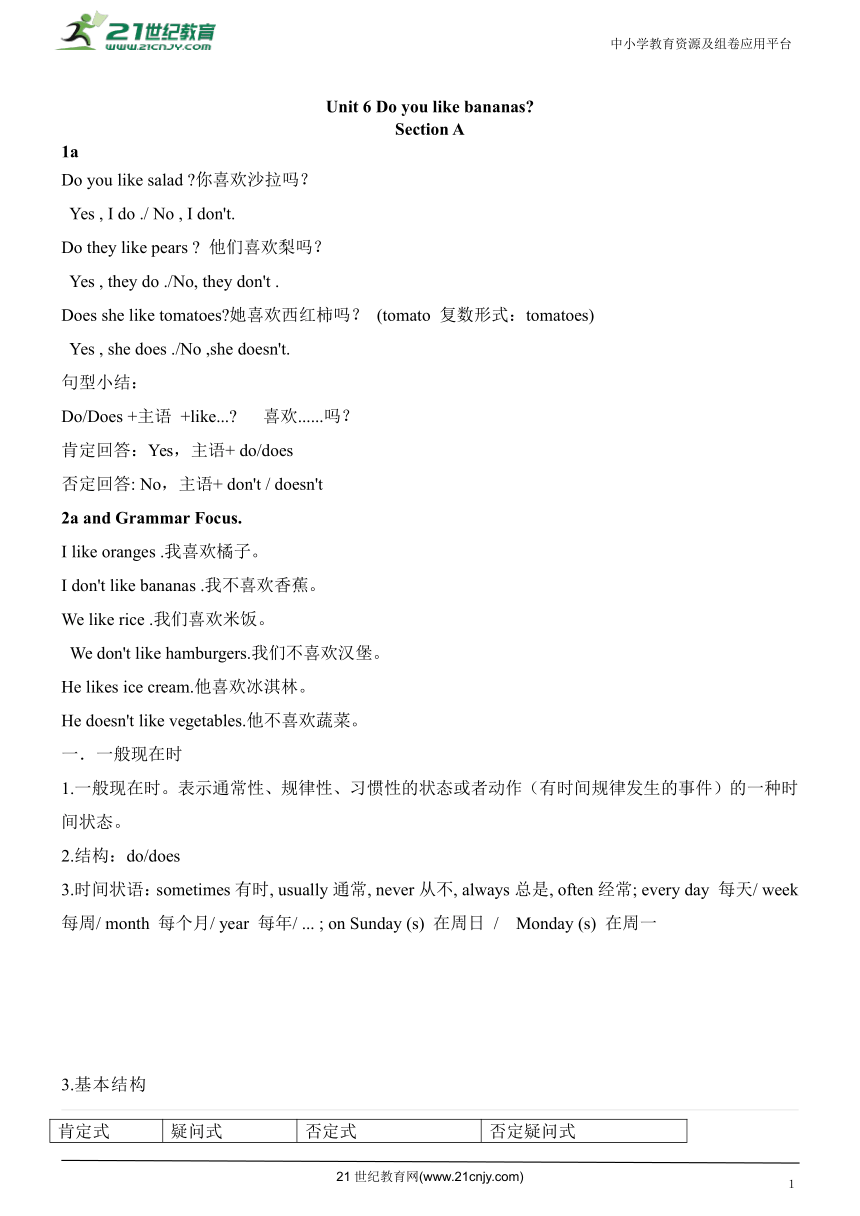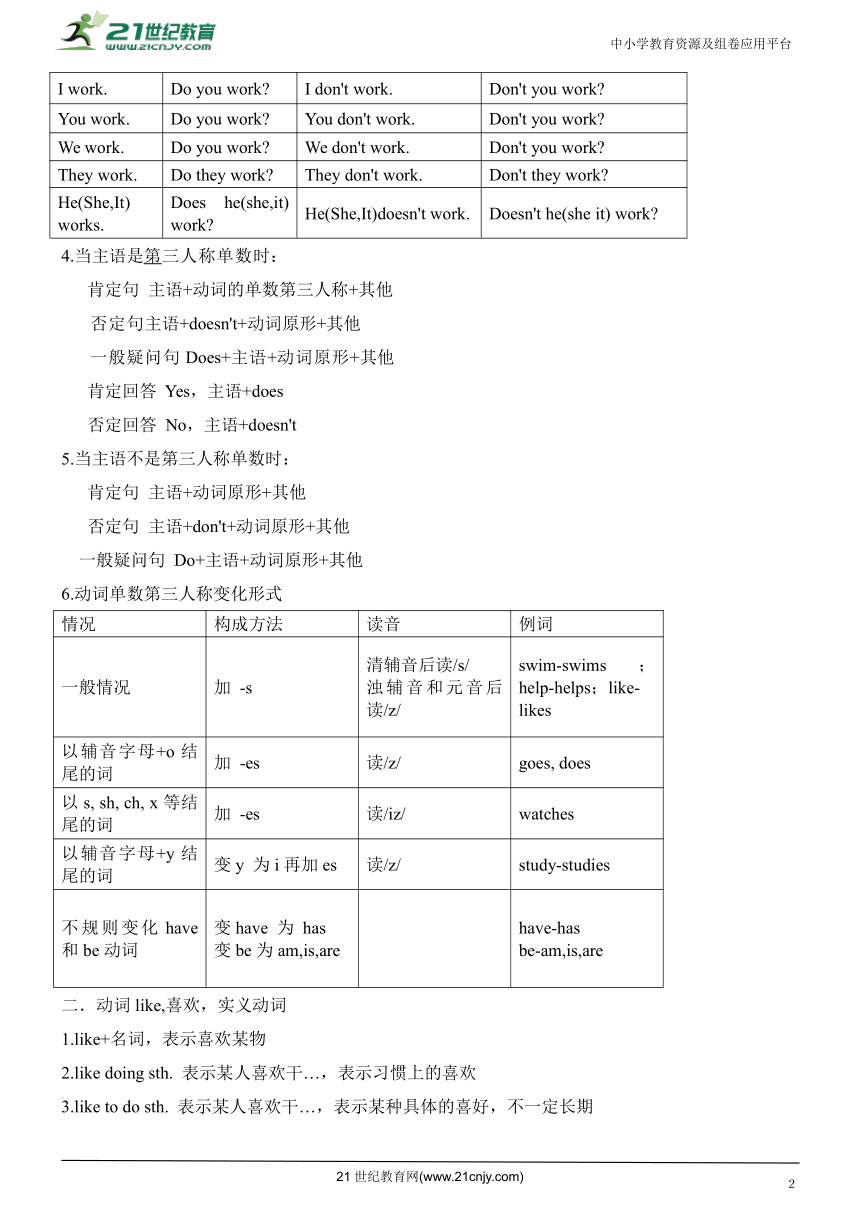Unit 6 Do you like bananas知识点总结
文档属性
| 名称 | Unit 6 Do you like bananas知识点总结 |  | |
| 格式 | docx | ||
| 文件大小 | 62.1KB | ||
| 资源类型 | 试卷 | ||
| 版本资源 | 人教新目标(Go for it)版 | ||
| 科目 | 英语 | ||
| 更新时间 | 2023-09-17 22:05:04 | ||
图片预览


文档简介
中小学教育资源及组卷应用平台
Unit 6 Do you like bananas
Section A
1a
Do you like salad 你喜欢沙拉吗?
Yes , I do ./ No , I don't.
Do they like pears 他们喜欢梨吗?
Yes , they do ./No, they don't .
Does she like tomatoes 她喜欢西红柿吗? (tomato 复数形式:tomatoes)
Yes , she does ./No ,she doesn't.
句型小结:
Do/Does +主语 +like... 喜欢......吗?
肯定回答:Yes,主语+ do/does
否定回答: No,主语+ don't / doesn't
2a and Grammar Focus.
I like oranges .我喜欢橘子。
I don't like bananas .我不喜欢香蕉。
We like rice .我们喜欢米饭。
We don't like hamburgers.我们不喜欢汉堡。
He likes ice cream.他喜欢冰淇林。
He doesn't like vegetables.他不喜欢蔬菜。
一般现在时
一般现在时。表示通常性、规律性、习惯性的状态或者动作(有时间规律发生的事件)的一种时间状态。
结构:do/does
时间状语:sometimes有时, usually通常, never从不, always总是, often经常; every day 每天/ week 每周/ month 每个月/ year 每年/ ... ; on Sunday (s) 在周日 / Monday (s) 在周一
3.基本结构
肯定式 疑问式 否定式 否定疑问式
I work. Do you work I don't work. Don't you work
You work. Do you work You don't work. Don't you work
We work. Do you work We don't work. Don't you work
They work. Do they work They don't work. Don't they work
He(She,It) works. Does he(she,it) work He(She,It)doesn't work. Doesn't he(she it) work
当主语是第三人称单数时:
肯定句 主语+动词的单数第三人称+其他
否定句主语+doesn't+动词原形+其他
一般疑问句Does+主语+动词原形+其他
肯定回答 Yes,主语+does
否定回答 No,主语+doesn't
当主语不是第三人称单数时:
肯定句 主语+动词原形+其他
否定句 主语+don't+动词原形+其他
一般疑问句 Do+主语+动词原形+其他
动词单数第三人称变化形式
情况 构成方法 读音 例词
一般情况 加 -s 清辅音后读/s/ 浊辅音和元音后读/z/ swim-swims;help-helps;like- likes
以辅音字母+o结尾的词 加 -es 读/z/ goes, does
以s, sh, ch, x等结尾的词 加 -es 读/iz/ watches
以辅音字母+y结尾的词 变y 为i再加es 读/z/ study-studies
不规则变化have和be动词 变have 为 has 变be为am,is,are have-has be-am,is,are
动词like,喜欢,实义动词
like+名词,表示喜欢某物
like doing sth. 表示某人喜欢干…,表示习惯上的喜欢
like to do sth. 表示某人喜欢干…,表示某种具体的喜好,不一定长期
注意:当表示喜欢或不喜欢某物的时候,如果物品为可数名词,一定要用复数形式,即:喜不喜欢加复数
2d
Let’s think about the food. 让我们来考虑一下食物吧。
think about 考虑 思考
Let’s have strawberries and apples then.
then 那么 常用语句首/句尾。
Then, let’s begin!
Section B
1a-1e
(1) 三餐
meal饭 / 2.早餐 breakfast / 3.午餐lunch / 4.晚饭supper /5.正餐(中午或晚上吃的)dinner
吃饭用eat/have
have breakfast/lunch
I often have breakfast at 7 O'clock.
三餐前不加任何冠词
a big dinner 一顿大餐
a quick breakfast很快的早饭
三餐前介词用for
have/has ... for breakfast/lunch 某餐吃什么
I usually have eggs, milk and rice for breakfast.
She usually has eggs, bananas, and apples for breakfast.
2b
(1) well和good
good形容词,用来修饰名词;well副词,用来修饰行为动词、形容词或整个句子。当well表示身体好时,是形容词;
We eat well every day.
good: she is a good student.
eat well吃得好
eating habits.
She has a good eating habits.
3.What do you like for breakfast 你早餐喜欢吃什么?
What do/does sb like for+某餐?某人某餐喜欢吃什么?
What does your father like for lunch
He likes chicken and vegetables for lunch.
for+某餐 就某餐而言
For lunch, I like...
I like..., For lunch.
What+...do/does sb like 某人喜欢......
what fruit/vegetables/sports/color do/does sb like
4.健康health,为名词;健康的healthy,为形容词
healthy food健康食品
keep in (good)health 保持健康 = keep healthy ,keep可用stay代替
5.想;想要,实义动词 want
want to be 成为,变成
I don't want to be old.
I want to be a teacher.
He wants to be a teacher.
want sth.想要某物
want to do sth. 想要做某事
want sb. to do sth. 想让某人做某事
6.fat作形容词,胖的;作名词,反义词thin,瘦的,薄的,细的
7.star星星;明星;
running star 赛跑明星 sports star 运动明星
8.最后一个问题one last question
作文
My name is Bob. I am very healthy. I like healthy food. I eat well every day.
For breakfast, I like eggs and bread, but I don't like milk I have lunch at school. I like rice and some carrots for lunch. For dinner, I like chicken and salad. I like salad very much. After dinner I like eating fruit.
(举一反三,用第三人称写出你同伴或家人一日三餐喜欢吃什么,不喜欢吃什么)
提纲
21世纪教育网(www.21cnjy.com)
Unit 6 Do you like bananas
Section A
1a
Do you like salad 你喜欢沙拉吗?
Yes , I do ./ No , I don't.
Do they like pears 他们喜欢梨吗?
Yes , they do ./No, they don't .
Does she like tomatoes 她喜欢西红柿吗? (tomato 复数形式:tomatoes)
Yes , she does ./No ,she doesn't.
句型小结:
Do/Does +主语 +like... 喜欢......吗?
肯定回答:Yes,主语+ do/does
否定回答: No,主语+ don't / doesn't
2a and Grammar Focus.
I like oranges .我喜欢橘子。
I don't like bananas .我不喜欢香蕉。
We like rice .我们喜欢米饭。
We don't like hamburgers.我们不喜欢汉堡。
He likes ice cream.他喜欢冰淇林。
He doesn't like vegetables.他不喜欢蔬菜。
一般现在时
一般现在时。表示通常性、规律性、习惯性的状态或者动作(有时间规律发生的事件)的一种时间状态。
结构:do/does
时间状语:sometimes有时, usually通常, never从不, always总是, often经常; every day 每天/ week 每周/ month 每个月/ year 每年/ ... ; on Sunday (s) 在周日 / Monday (s) 在周一
3.基本结构
肯定式 疑问式 否定式 否定疑问式
I work. Do you work I don't work. Don't you work
You work. Do you work You don't work. Don't you work
We work. Do you work We don't work. Don't you work
They work. Do they work They don't work. Don't they work
He(She,It) works. Does he(she,it) work He(She,It)doesn't work. Doesn't he(she it) work
当主语是第三人称单数时:
肯定句 主语+动词的单数第三人称+其他
否定句主语+doesn't+动词原形+其他
一般疑问句Does+主语+动词原形+其他
肯定回答 Yes,主语+does
否定回答 No,主语+doesn't
当主语不是第三人称单数时:
肯定句 主语+动词原形+其他
否定句 主语+don't+动词原形+其他
一般疑问句 Do+主语+动词原形+其他
动词单数第三人称变化形式
情况 构成方法 读音 例词
一般情况 加 -s 清辅音后读/s/ 浊辅音和元音后读/z/ swim-swims;help-helps;like- likes
以辅音字母+o结尾的词 加 -es 读/z/ goes, does
以s, sh, ch, x等结尾的词 加 -es 读/iz/ watches
以辅音字母+y结尾的词 变y 为i再加es 读/z/ study-studies
不规则变化have和be动词 变have 为 has 变be为am,is,are have-has be-am,is,are
动词like,喜欢,实义动词
like+名词,表示喜欢某物
like doing sth. 表示某人喜欢干…,表示习惯上的喜欢
like to do sth. 表示某人喜欢干…,表示某种具体的喜好,不一定长期
注意:当表示喜欢或不喜欢某物的时候,如果物品为可数名词,一定要用复数形式,即:喜不喜欢加复数
2d
Let’s think about the food. 让我们来考虑一下食物吧。
think about 考虑 思考
Let’s have strawberries and apples then.
then 那么 常用语句首/句尾。
Then, let’s begin!
Section B
1a-1e
(1) 三餐
meal饭 / 2.早餐 breakfast / 3.午餐lunch / 4.晚饭supper /5.正餐(中午或晚上吃的)dinner
吃饭用eat/have
have breakfast/lunch
I often have breakfast at 7 O'clock.
三餐前不加任何冠词
a big dinner 一顿大餐
a quick breakfast很快的早饭
三餐前介词用for
have/has ... for breakfast/lunch 某餐吃什么
I usually have eggs, milk and rice for breakfast.
She usually has eggs, bananas, and apples for breakfast.
2b
(1) well和good
good形容词,用来修饰名词;well副词,用来修饰行为动词、形容词或整个句子。当well表示身体好时,是形容词;
We eat well every day.
good: she is a good student.
eat well吃得好
eating habits.
She has a good eating habits.
3.What do you like for breakfast 你早餐喜欢吃什么?
What do/does sb like for+某餐?某人某餐喜欢吃什么?
What does your father like for lunch
He likes chicken and vegetables for lunch.
for+某餐 就某餐而言
For lunch, I like...
I like..., For lunch.
What+...do/does sb like 某人喜欢......
what fruit/vegetables/sports/color do/does sb like
4.健康health,为名词;健康的healthy,为形容词
healthy food健康食品
keep in (good)health 保持健康 = keep healthy ,keep可用stay代替
5.想;想要,实义动词 want
want to be 成为,变成
I don't want to be old.
I want to be a teacher.
He wants to be a teacher.
want sth.想要某物
want to do sth. 想要做某事
want sb. to do sth. 想让某人做某事
6.fat作形容词,胖的;作名词,反义词thin,瘦的,薄的,细的
7.star星星;明星;
running star 赛跑明星 sports star 运动明星
8.最后一个问题one last question
作文
My name is Bob. I am very healthy. I like healthy food. I eat well every day.
For breakfast, I like eggs and bread, but I don't like milk I have lunch at school. I like rice and some carrots for lunch. For dinner, I like chicken and salad. I like salad very much. After dinner I like eating fruit.
(举一反三,用第三人称写出你同伴或家人一日三餐喜欢吃什么,不喜欢吃什么)
提纲
21世纪教育网(www.21cnjy.com)
同课章节目录
- starters 预备篇(2012秋审查)
- Unit 1 Good morning !
- Unit 2 What’s this in English?
- Unit 3 What color is it ?
- Unit 1 My name's Gina.
- Section A
- Section B
- Unit 2 This is my sister.
- Section A
- Section B
- Unit 3 Is this your pencil?
- Section A
- Section B
- Unit 4 Where's my schoolbag?
- Section A
- Section B
- Unit 5 Do you have a soccer ball?
- Section A
- Section B
- Unit 6 Do you like bananas?
- Section A
- Section B
- Unit 7 How much are these socks?
- Section A
- Section B
- Unit 8 When is your birthday?
- Section A
- Section B
- Unit 9 My favorite subject is science.
- Section A
- Section B
